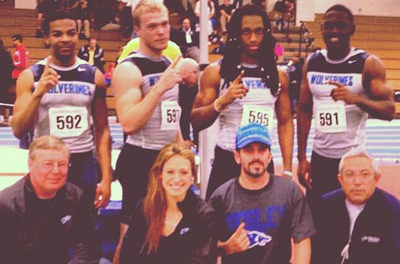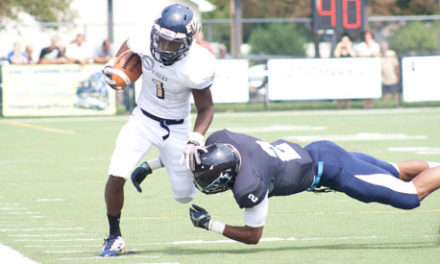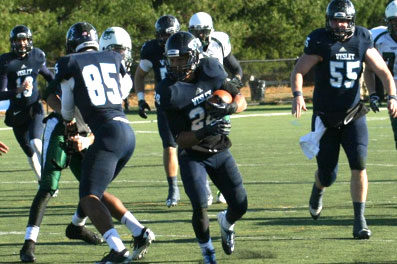By Kim Manahan (Whetstone Writer Staff)
Sophomore Taylor Hendricks’ softball schedule seems to always clash with her classes.
“This year we have more away games on our schedule, so the travel time makes it more difficult,†said Hendricks, an environmental science major.
Hendricks is just one of many athletes – along with their frustrated professors – who have found that spring sports and academics sometimes have a hard time mixing.
Susan Bobby, an English professor, gives students a set number of “allowable†absences in her 100- and 200-level classes, but if they go beyond that, they lose points off of their grades.
“The allowable absences are for any absence,†she said. “Sports, academic event, illness or a skipped class.â€
Bobby said she thinks all students should be treated the same.
“If a student is an athlete, I don’t they should be allowed more absences than any other student,†she said. “That would be a form of preferential treatment and I am not in favor of that.â€
Keven Lion, a senior math major, plays lacrosse and ice hockey.
“My athletics schedule sometimes interferes with class time,†he said. “But usually not more than once a week. If there is a conflict, it’s usually only for away games.â€
There are no lights for the baseball and softball fields, said Tracy Short, field hockey head coach, so many of the softball games are scheduled earlier, sometimes at 3 p.m.
Turf fields and lights would help, she said, since the weather in March and April is unpredictable.
It cost $150,000 to install lights in the Scott D. Miller Stadium in 2004, which allows for teams to play at night.
It would cost $300,000 to put them on the baseball field, said Tripp Keister, associate director of sports. That’s more than half of the athletics budget.
Coaches said they give student athletes their schedules in advance so that they can schedule their classes around it.
“I purposely pick my classes so they won’t interfere with practice times,†said sophomore lacrosse player, Alyssa Batty. “But most away games require me to miss some sort of class.â€
Batty and Hendricks both said teachers have never given them a hard time about missing class, but Batty said a teammate’s professor would not sign her blue slip, which the teacher may fill out with the work the student misses.
The blue slip in not an excusal form, said Mike Drass, director of athletics. The actual excusal comes from the dean’s office.
Even so, teachers do not have to excuse anyone if their classroom rules do not allow it, regardless of the dean’s office.
“If a faculty member says to a student you can’t miss class, we have to say something to the academic dean, which we don’t want to do,†Drass said. “I don’t know if there’s ever been a ‘You can’t go,’ but that’s when the coach has to work with the professor.â€
If a student misses class, the person in charge of the group activity needs to get approval from the Office of Academic Affairs, the student handbook says. Academic Affairs then sends out a list of names to faculty.
The college then allows up to 10 class days from the date of return to make up the work and allows the instructor and Dr. Patricia Dwyer, vice president of academic affairs, to make exceptions.
“The faculty try to work with the student athletes in terms of absence from class,†Dwyer said. “Typically, a faculty member gives students two or three excused absences depending on how often the class meets. Student athletes are directed by the coaching staff that because they may be missing class for a game, they may not use the excused absences in addition to the days they are out for an athletic event.â€
Getting the work made up is the student-athletes’ responsibilities.
“I always made sure to get whatever notes or assignments from the professor that I needed the day before,†Lion said.
Student athletes have their teachers sign the blue slip with the work they have to make up for a missed class.
“Everyone’s a college student,†Drass said. “They should be here for their education – that’s filed under common sense.â€
Professors have different attendance policies.
“They have to make up the work,†said Dr. Susan Fox, professor of history. “I don’t think they deserve special treatment, but they’re not penalized.â€
If a student shows dedication to the class, Fox said that she’s “cool about it.â€
“Every professor I have had since being at Wesley has not had any issue with a couple of classes being missed for games,†Lion said.
Some students have abused the blue forms.
“My whole team doesn’t travel,†Drass said. “Kids turned in the blue slip who were not on the travel rooster.â€
Non-athletes would also try to use the form, the coaches said. They were right outside of the athletics office when it was in the College Center and students would grab them.
Hendricks does not think that softball has affected her grades.
“I’ve worked with my professors and have developed good time management skills from my time doing several extracurriculars throughout high school,†she said.
Last fall, student athletes averaged a 2.64 grade point average.




